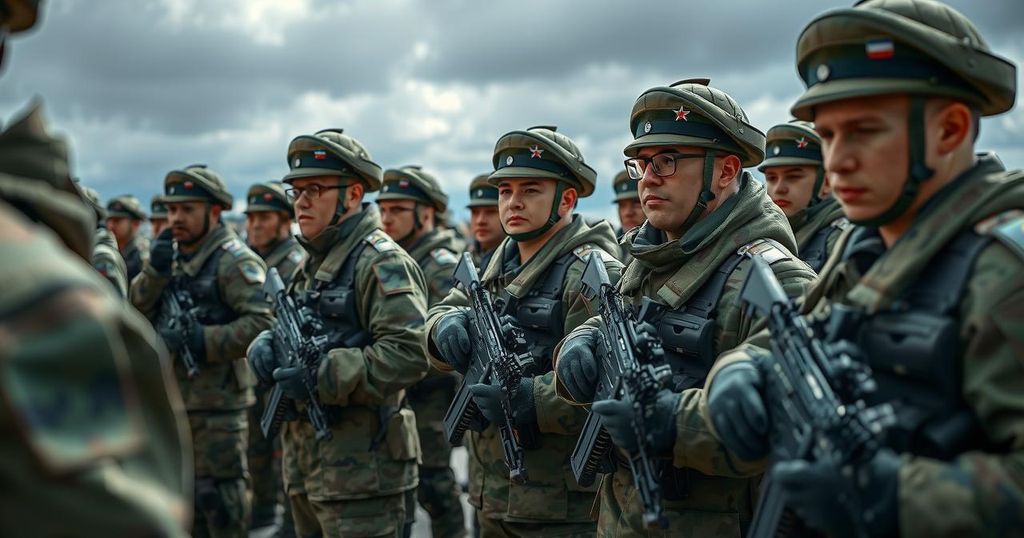World news
11TH CORPS, ASIA, CANCIAN, CENTER, CENTRE FOR STRATEGIC AND INTERNATIONAL STUDIES, CSIS, DEFENCE, ENERGY INFRASTRUCTURE, EUROPE, EUROPE/ASIA, KOREA, NORTH, KOREAN PEOPLE ' S ARMY, MARK CANCIAN, MICHAEL MADDEN, MILITARY, MILITARY STRATEGY, MOSCOW, NORTH AMERICA, NORTH KOREA, PYONGYANG, RUSSIA, STORM CORPS, THE PENTAGON, UKRAINE, UNITED STATES, US, WAR, WASHINGTON
Daniel O'Connor
0 Comments
Understanding the Role of North Korean Troops in Ukraine’s Conflict
North Korean troops appear to be participating in combat roles in Ukraine, with estimates of deployment numbers varying significantly. While lacking recent combat experience, elite units from North Korea are reportedly being trained by Russian forces. The collaboration suggests mutual benefits, including financial gain for North Korea and additional manpower for Russia. Meanwhile, South Korea expresses growing concerns about regional security as tensions on the Korean peninsula escalate due to this emerging alliance.
Recent reports indicate that North Korean troops have engaged in combat roles to support Russia’s military efforts in Ukraine, contrary to their initially expected non-combat functions. Originally suggested numbers were around 11,000 troops, but some sources now estimate the deployment could reach 100,000. While North Korean forces are large, with 1.28 million active members, their recent combat experience is limited. However, intelligence suggests that elite troops from the 11th Corps, trained for difficult operations, are among those sent to Russia. While Moscow reportedly provides additional training, these troops may also face challenges due to language barriers and unfamiliarity with Russian military techniques. North Korea’s involvement stems partly from its desire for financial gain and military technology, as they are expected to receive $2,000 per soldier on deployment, with potential access to advanced Russian technology. The implications of these developments have heightened tensions on the Korean peninsula, particularly as South Korean leaders express concerns about increased military capabilities for North Korea. \n\nReports also suggest that North Korean forces may be stationed near the contested Kursk border, contributing to an unstable environment as both North and South Korea engage in rising military rhetoric. South Korean President Yoon Suk Yeol has indicated potential support for Ukraine, signaling a shift in South Korea’s long-standing policy of non-involvement in foreign military conflicts.
The involvement of North Korean troops in Ukraine represents a strategic alliance between North Korea and Russia amidst a precarious military situation. North Korea is likely motivated by financial incentives as it seeks funding through its military deployment while also looking for advanced technology to bolster its own military capabilities. Observers highlight that this arrangement may help Russia counteract its manpower shortages exacerbated by significant losses in the Ukraine conflict. Additionally, the increasing militarization and escalated tensions between the two Koreas raise alarms, particularly regarding North Korea’s potential to enhance its combat readiness and capabilities through this alliance.
The deployment of North Korean troops in Ukraine illustrates a complex intersection of military, financial, and geopolitical interests involving Pyongyang and Moscow. While the true effectiveness of these troops remains uncertain, their involvement could result in significant implications for regional security in East Asia, particularly concerning South Korea’s defenses against an emboldened North. The increasing potential for military cooperation between these historically adversarial states marks a troubling development in the ongoing conflict.
Original Source: www.bbc.com




Post Comment